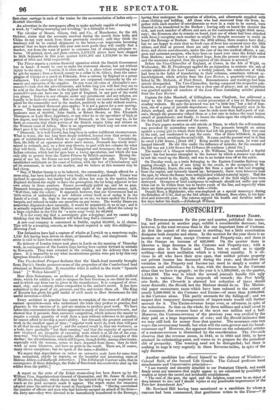POSTSCRIPT.
SATURDAY NIGHT.
The Revenue-accounts for the year and quarter, published this morn- ing, and printed in another page, exhibit a considerable decrease; less, however, in the total revenue than in the one important item of Customs. At first the aspect of the account is startling; but a little examination dissipates both surprise and alarm. In the account for the year there is an increase on every item, except Customs and Property-tax; and there is in the Stamps an increase of 428,000/. On the quarter there is likewise a large decrease in the Customs and Property-tax; with a decrease also in the Excise and Taxes, but so small as to signify nothing—that mere oscillation which is a virtual equality. It is ob- vious to all who have their eyes open, that neither private property nor private income has decreased during the year; and therefore the variation in the Property and Income tax must be simply a matter of accounts and collection. It is, then, with the decrease in the Customs alone that we have to grapple: on the year it is 1,590,0001., on the quarter, 1,154,0001. The way in which the several journals handle this ugly feature is various: the Times suspends all remark; the Post briefly sets forth; the Chronicle is alarmed lest reduction of taxes shouli incur discredit; the Herald, lest the Minister should do so. The Ministe- rial paper enumerates taxes which have been reduced to the extent of nearly 3,500,0001. in the Customs and Excise—of more than 2,000,0001. in the Customs alone. This partly accounts for the falling-off ; and we suspect that temporary derangements of import-trade would still further account for it. The Excise-revenue keeps even, or advances, in spite of the reductions. So that on the whole, for three millions and a half saved to the consumer, the revenue loses at the most one million and a half. Moreover, the Customs-revenue of the previous year was swelled by the duty paid on a large importation of corn; and the Herald intimates that we may still look for money from that quarter. The assurance cuts two ways: the revenuemay benefit, but what will the corn-grower and the bread- consumer say? However, the apparent decrease on the substantial articles of a customs-revenue is diminished by the consideration. The Chronicle observes that the revenue seems, in 1845, as in 1825 and 1835, to have attained its culminating-point, and warns us to prepare for the periodical ebb of prosperity. The warning need not be disregarded; but there is nothing to urge it very cogently in these Revenue-tables, in spite of the ugly decrease.


























 Previous page
Previous page